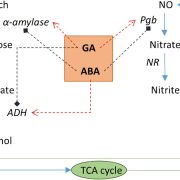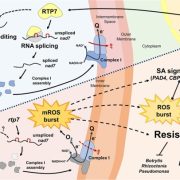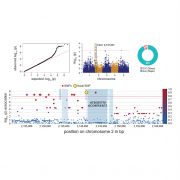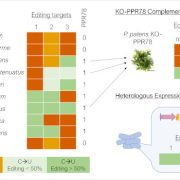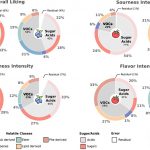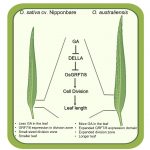Mitochondrial retrograde signaling through UCP1-mediated inhibition of the plant oxygen-sensing pathway (Curr Biol)
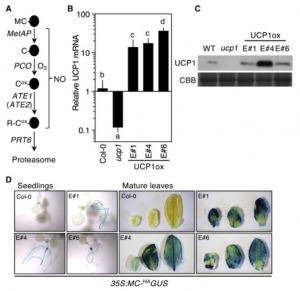 Plants have a plethora of oxygen requiring enzymes that are essential for survival. Mitochondria require oxygen to create ATP, yet during hypoxia they can alter gene expression in the nucleus through retrograde signaling, which may promote stress tolerance. Barreto et al. recently delineated a novel actor in the elusive signal transduction pathway in retrograde signaling by showing that overexpression of UCP1, an inner mitochondrial membrane protein, induces hypoxia gene expression in Arabidopsis nuclei. Overexpression of UCP1 promoted tolerance to high salt in seedlings and hypoxia in seedling root meristems. UCP1 inhibits the cytosolic plant oxygen-sensing PRT6 N-degron pathway, thus preventing proteasomal degradation of hypoxia-associated transcription factors, ERFVIIs, thereby increasing expression of two hypoxia gene markers. This work has revealed a novel actor in retrograde signaling during hypoxia, integrating mitochondrial oxygen consumption with cytosolic oxygen sensing machinery. Future work will examine the role of the multifunctional protein UCP1 in influencing mitochondrial signaling. (Summary by Orla Sherwood @orlasherwood) Curr. Biol. https://doi.org/10.1016/j.cub.2022.01.037
Plants have a plethora of oxygen requiring enzymes that are essential for survival. Mitochondria require oxygen to create ATP, yet during hypoxia they can alter gene expression in the nucleus through retrograde signaling, which may promote stress tolerance. Barreto et al. recently delineated a novel actor in the elusive signal transduction pathway in retrograde signaling by showing that overexpression of UCP1, an inner mitochondrial membrane protein, induces hypoxia gene expression in Arabidopsis nuclei. Overexpression of UCP1 promoted tolerance to high salt in seedlings and hypoxia in seedling root meristems. UCP1 inhibits the cytosolic plant oxygen-sensing PRT6 N-degron pathway, thus preventing proteasomal degradation of hypoxia-associated transcription factors, ERFVIIs, thereby increasing expression of two hypoxia gene markers. This work has revealed a novel actor in retrograde signaling during hypoxia, integrating mitochondrial oxygen consumption with cytosolic oxygen sensing machinery. Future work will examine the role of the multifunctional protein UCP1 in influencing mitochondrial signaling. (Summary by Orla Sherwood @orlasherwood) Curr. Biol. https://doi.org/10.1016/j.cub.2022.01.037


